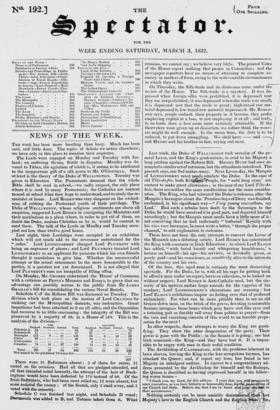NEWS OF THE WEEK.
THE week has been more bustling than busy. Much has been
• said, and little done. The topics of debate we notice elsewhere; we have only in this place to mention their sequence.
The Lords were engaged on Monday and Tuesday with Ire- land; an enduring theme, fertile in disputes. Monday was de- -voted to Tithes, the agitation of which is, it seems, to be attributed to the inopportune gift of a silk gown to Mr. O'CONNELL. Such :at least is the theory of the Duke of WELLINGTON. Tuesday was ,given to Education. The Protestants demand that the whole Bible shall be read in school,—we sadly suspect, the only place where it is read by many Protestants; the Catholics are content tamed at school *hat they hope to understand, and to study the re- mainder at home. Lord RonixWas very eloquent on the wicked- ness of robbing the Protestant youth of their privilege. The Duke of WELLINGTON, whose religious sentiments are above all suspicion, supported Lord RonEx in consigning the Ministers and their mutilations to a place where, in order to get rid of them, no doubt the Duke, zealous Christian as he is, Would be content to send them. The talk Of the Lords on Monday and Tuesday oceu pied not less than -twelve good hours.
Last night, their Lordships were occupied in an exhibition Which will not much add to the reverence entertained for the ",order."• Lord LONDONDERRY charged Lord PLUNKETT with being an engrosser of places; and Lord PLUNKETT taunted Lord LONDONDERRY as an applicant for pensions which his own friends thought it scandalous to give him. Whether the unsuccessful attempt or the actual attainment be the more honourable to the parties, is a question not yet determined. It is not alleged. that Lord PLUNKETT'S sons are incapable of filling office;.
- On Monday, Mr. CROKER entertained the House- of Commons with a criticism on PEPYS'S Memoirs and Essays, to prove that no advantage can sposiibly accrue to the public from Sir JAMES GRAHAM'S bill for -consolidating the various Naval Boards.
• Schedule C of the Reform Bill was discussed on Tuesday. The division which took place on the motion of Lord CHANDOS for striking out the Metropolitan .districts, was instructive. Great importance had been attached to it _on all sides, and the Opposition had recourse to no little canvassing: the integrity of the Bill was preserved by a majority of 80, in a House of 569. This is the analysis_ of the division.—.
FOR. AGAINST.
Scotland. Ireland. Total. England. Scotland. Iceland. Total.
:ScheduleA. .24 — 24 Schedule B. 17 — — 17 'Boroughs 113 .... 9 .... 17 .... 140 Cities :UniVersities — —— Counties 74 ..:. .... 37 ':::: 129 14 .... 15 .... 13 .... 42 Total . - 26019 54 333 185 21 30 236 Not named in the published Division-list 17 253 _ There were 35 ,Reformers absent; 3 of them for cause, 21 ratted . on the "occasion.'. Had all• that are pledged attended, and all that attended acted honestly, the attempt of the heir of Buck- inghani*Ould have been defeated by 170 instead of 80. Of the Irish Reibkiners, who had been most relied on,- 12 were 'absent, but none assisted the enemy; of the Scotch, only 2 staid away, and 3 voted with the:minority. Schedule C was finished last night, and Schedule D voted;
Dartmouth was added .to B, and Toiness taken from it What _
remains, we cannot say ; we believe very little. The printed Votes of the House report nothing that passes in Committee; and the newspaper reporters have no means of attaining to complete ac- curacy in matters of form, owing to the unfavourable circumstances in which they write.
On Thursday, the Silk-trade and its distresses came under the review of the House. The Silk-trade is a mystery. It was de- pressed when foreign silks were prohibited, it is depressed now they are not prohibited; it was depressed when the trade was small, it is depressed now that the trade' is great; high-taxed raw ma- terial depressed it, low-taxed raw material depresses it. Mr. ROBIN- SON says, people embark their property in it because they prefer : employing capital at a loss, to not employing it at all ; and truly, I in no trade does a loss seem more certainly attainable. If the I throwsters were given up at discretion, we rather think the weav- ers might do well enough. In the mean time, the duty is to be I j reduced, to put down smuggling. We shall have — and —, and HENRY and his brother-in-law, crying out next.


























